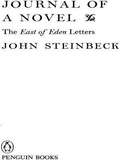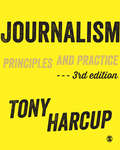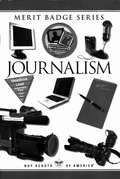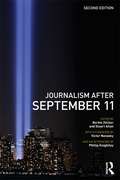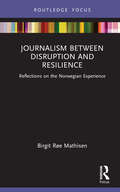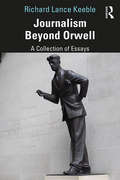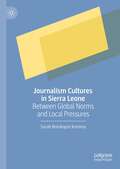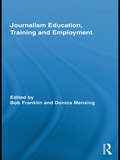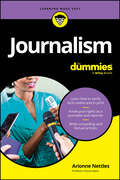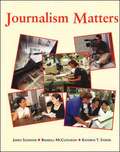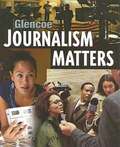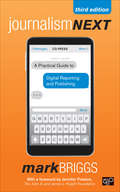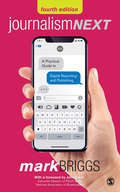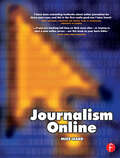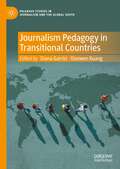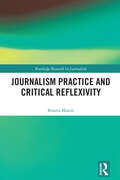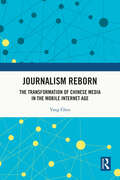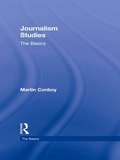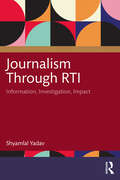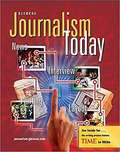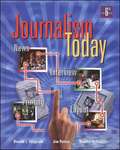- Table View
- List View
Journal of a Novel: The East of Eden Letters
by John SteinbeckEach working day from January 29 to November 1, 1951, John Steinbeck warmed up to the work of writing East of Eden with a letter to the late Pascal Covici, his friend and editor at The Viking Press. It was his way, he said, of "getting my mental arm in shape to pitch a good game. " Steinbeck's letters were written on the left-hand pages of a notebook in which the facing pages would be filled with the test of East of Eden. They touched on many subjects--story arguments, trial flights of worknamship, concern for his sons. Part autobiography, part writer's workshop, these letters offer an illuminating perspective on Steinbeck's creative process, and a fascinating glimpse of Steinbeck, the private man. .
Journalism
by Tony HarcupJournalism: Principles & Practice remains the essential textbook for all students of journalism. With each print copy of the new third edition, students receive FREE access to the interactive eBook edition offering on-the-go access to a wealth of digital resources including video tutorials from the author himself! Journalism: Principles and Practice is the must-have guide to everything students need to know about how journalism works. This new edition is fully updated to cover the new essentials: social media, the impact of Twitter, and the need for an ethical approach. This book will equip you with all the skills and savvy you need to become the resourceful yet ethical journalists of the future. New and improved features will help you: Get to grips with the huge impact of social and mobile media on how we gather information and tell stories Grasp the rights and wrongs of journalism with a new chapter on ethics and regulation Learn how to make the most of your skills with tips and advice from digital and other journalists Think through 'what would you do?' in a new feature that takes you into the real world of journalism This new edition retains its innovative two-column structure, stylishly blending theory and practice. As relevant to the newsroom as the seminar room, it is the one book you will need to take you through your degree and into your career as a journalist.
Journalism (Handbooks Of Communication Science [hocs] Ser. #19)
by Tim P. VosThis volume sets out the state-of-the-art in the discipline of journalism at a time in which the practice and profession of journalism is in serious flux. While journalism is still anchored to its history, change is infecting the field. The profession, and the scholars who study it, are reconceptualizing what journalism is in a time when journalists no longer monopolize the means for spreading the news. Here, journalism is explored as a social practice, as an institution, and as memory. The roles, epistemologies, and ethics of the field are evolving. With this in mind, the volume revisits classic theories of journalism, such as gatekeeping and agenda-setting, but also opens up new avenues of theorizing by broadening the scope of inquiry into an expanded journalism ecology, which now includes citizen journalism, documentaries, and lifestyle journalism, and by tapping the insights of other disciplines, such as geography, economics, and psychology. The volume is a go-to map of the field for students and scholars-highlighting emerging issues, enduring themes, revitalized theories, and fresh conceptualizations of journalism.
Journalism (Merit Badge Series)
by Boy Scouts of America StaffEnhancing our youths' competitive edge through merit badges
Journalism After September 11 (Communication and Society)
by Stuart Allan Barbie ZelizerPraise for the first edition: This collection of essays comes mainly from academics but nobody should bridle at theorists lecturing practitioners. They properly challenge the way September 11th was reported - in a way that's both an endorsement of the role of the media and a wake-up call on its failures . . . anyone interested in our trade should read it.' - Roger Mosey, Ariel'A thoughtful and engaging examination of the effects of 9/11 on the field of journalism. Its unique aim is to discuss the impact of the attack as a personal trauma and its current and future effects on journalism and the reporting of the news. . . highly recommended.' - Library Journal Journalism After September 11 examines how the traumatic attacks of that day continue to transform the nature of journalism, particularly in the United States and Britain. Familiar notions of what it means to be a journalist, how best to practice journalism, and what the public can reasonably expect of journalists in the name of democracy, were shaken to their foundations. Ten years on, however, new questions arise regarding the lasting implications of that tragic day and its aftermath. Bringing together an internationally respected collection of scholars and media commentators, Journalism After September 11 addresses topics such as: journalism and public life at a time of crisis; broadsheet and tabloid newspaper coverage of the attacks; the role of sources in shaping the news; reporting by global news media such as CNN; Western representations of Islam; current affairs broadcasting; news photography and trauma; the emotional well-being of reporters; online journalism; as well as a host of pertinent issues around news, democracy and citizenship. This second edition includes four new chapters – examining Arabic newspaper reporting of the attacks, the perceptions of television audiences, national magazine coverage of the ensuing crisis, and the media politics of ‘othering’ – as well as revised chapters from the first edition and an updated Introduction by the co-editors. A foreword is provided by Victor Navasky and an afterword by Phillip Knightley.
Journalism Between Disruption and Resilience: Reflections on the Norwegian Experience (Disruptions)
by Birgit Røe MathisenFollowing recent developments in digital technologies, financial crises, and changes in audience preferences, this book addresses the critical challenges and disruptions facing the profession of journalism: an arguably precarious industry suffering from employment insecurity, individualization, and loss of autonomy. Drawing on research from the Norwegian and Nordic media landscape, Journalism Between Disruption and Resilience elaborates on how boundary struggles between journalism and other forms of content, such as marketing and public relations, have become blurred, while social distinctions within the profession are deepened and exacerbated by downsizing and cutbacks in newsrooms and their journalistic staffs. The impact of these developments on the institutional and democratic role of journalism in society is discussed alongside the tensions between professional autonomy and precarious work. Expanding upon several earlier research studies, grounded in the sociology of professions and freelance work, this book provides a new theoretical framework from which to addressjournalistic precarity and the role of journalism in society. This is an insightful study for advanced students and researchers in the areas of professional journalism, journalism education, and media industries including marketing and public relations.
Journalism Beyond Orwell
by Richard Lance KeebleJournalism Beyond Orwell adapts and updates pioneering work by Richard Lance Keeble to explore George Orwell’s legacy as a journalist in original, critical – and often controversial – ways. Though best known as the author of Animal Farm and Nineteen Eighty-Four, Orwell was, throughout his career, a journalist. The essays in this collection explore Orwell’s important legacy: as a practising activist journalist critical of the dominant media; as a polemicist, essayist and novelist constantly concerned with issues relating to war and peace; as a literary journalist determined to make ‘political writing an art’; and as a writer who warned of the growing powers of the secret state. Through this highly individualistic essay collection that connects Orwellian themes to modern journalism, Richard Lance Keeble explores key topics, including: Orwell the ‘proto-blogger’ How Orwell put his political economy critique of the corporate press into practice Information warfare in an age of hyper-militarism The manufacture of the myth of heroic warfare in the reporting of the Afghan conflict The debates over the theory and practice of peace journalism The ethical challenges for journalists reporting on conflict The crucial role of the alternative media The pleasures and pitfalls of the celebrity profile This collection will be of particular interest to students and researchers in journalism studies, English literature, media, intelligence studies and international relations.
Journalism Cultures in Sierra Leone: Between Global Norms and Local Pressures
by Sarah Bomkapre KoromaThis book provides novel insights into the perspectives of journalists in Sierra Leone and on their work by examining their perceived journalistic values and the influences that shape them. It treats journalism as an occupational identity and as a community that works on the foundation of the sub-Saharan African philosophies that exalts communal values in every sphere of life. When journalists speak about their social function in society and values, they are sharing both their individual knowledge and experiences on their work. Therefore, journalistic values are never isolated ideologies, but exist within the contexts in which they practice. In this book, Sarah Bomkapre Koroma examines the perceptions of journalists on the societal influences that impact their work, ranging from individual, procedural, organizational, political, economic, and many more. Questions explored include:What journalism cultures exist in Sierra Leone?What effects do societal factors have on these journalistic cultures?How do journalists in Sierra Leone describe their roles?What epistemological underpinnings do they consider during practice?What ethical considerations do the journalists share?
Journalism Education, Training and Employment (Routledge Research in Journalism)
by Bob FranklinDuring this period of rapid and significant change in journalistic practices, journalism educators are re-examining their own profession and contributing to the invention of new models and practices. This edited volume of studies by respected international scholars describes the diverse issues journalism educators are grappling with and the changes they are making in purpose and practice. The book is organized into three sections -- education, training and employment – that explore common themes: How the assumptions embedded in journalism education are being examined and revised in the light of transformative changes in communication; How the definitions of journalism and journalists are broadening in scope and what this means for educators; How newsrooms and training programs around the world are being re-examined and made more effective. An introductory essay and section summaries provide context for the thirteen chapters that constitute the collection. The section on journalism education explores fundamental ways educators are seeking to make their institutions and practices stronger and more responsive. The section on training includes case studies of journalism training programs in sub-Saharan Africa, Turkey, Sweden and the U.S. The final section examines the job prospects and employment market for journalism students with data from the U.S., U.K, Australia, and Sweden. The scope of issues considered in the book makes it a valuable resource for journalism scholars from around the world, as well as doctoral students, journalism and communication administrators in universities, organizations that fund journalism training programs, and practitioners interested in understanding employment and education trends.
Journalism For Dummies
by Arionne NettlesLearn the skills you need to find sources, fact check, and write trusted articles Since the advent of the internet and the birth of social media, it has become difficult to wade through the massive amount of information out there. Every day we see—and believe—news articles that are released then debunked the very next day. Journalism For Dummies will provide you with the tools you need to become a savvy interviewer, writer, and fact checker. If you're a journalist, a journalist-to-be, or just someone who wants to be smarter about what you read, this book can help. You'll learn how journalism has evolved into what it is today, how to utilize different media platforms, including social media, and how to produce work that people can trust. This book is a comprehensive and approachable entry point for anyone who wants to produce pieces with journalistic integrity. Consider how journalism functions in society, and why trustworthy journalism matters Become media literate and identify sensational or misleading stories and articles Learn about the reporting process, including newsworthiness, sourcing, fact-checking, and interview best practices Discover the ethics and laws associated with being a digital and print journalist This is a great Dummies guide for students majoring in or taking journalism courses, freelance journalists looking to improve their sourcing abilities, and teachers hoping to increase their students' journalistic skills.
Journalism Matters
by James Schaffer Kathryn T. Stofer Randall MccutcheonJournalism Matters is designed to introduce your students into the world of working journalists. Every section of this engaging textbook will help prepare your students for the challenges of school newspapers, magazines, yearbooks, even television and radio programs. The theme of Journalism Matters is the ethical responsibility that journalists hold in today's multicultural community. This comprehensive text will give your students a broad overview of news media with rewarding activities and compelling examples.
Journalism Next: A Practical Guide to Digital Reporting and Publishing
by Mark E. BriggsThe Third Edition of Journalism Next: A Practical Guide to Digital Reporting and Publishing is the most informed, practical, and succinct guide to digital technology for journalists. Author Mark Briggs’ forward-thinking techniques and accessible style prepares today’s journalists for tomorrow’s media landscape transformations. Readers will learn how to effectively blog, crowdsource, use mobile technology, mine databases, and expertly capture audio and video to report with immediacy, cultivate community, and convey compelling stories. Briggs helps readers quickly improve their digital literacy by presenting the basics and building on them to progress towards more specialized skills within multimedia. Readers will become equipped to better manage online communities and build an online audience. Journalism Next is a quick yet valuable read that provides a detailed roadmap for journalists to reference time and time again.
Journalism Next: A Practical Guide to Digital Reporting and Publishing
by Mark E. BriggsThe Third Edition of Journalism Next: A Practical Guide to Digital Reporting and Publishing is the most informed, practical, and succinct guide to digital technology for journalists. Author Mark Briggs’ forward-thinking techniques and accessible style prepares today’s journalists for tomorrow’s media landscape transformations. Readers will learn how to effectively blog, crowdsource, use mobile technology, mine databases, and expertly capture audio and video to report with immediacy, cultivate community, and convey compelling stories. Briggs helps readers quickly improve their digital literacy by presenting the basics and building on them to progress towards more specialized skills within multimedia. Readers will become equipped to better manage online communities and build an online audience. Journalism Next is a quick yet valuable read that provides a detailed roadmap for journalists to reference time and time again.
Journalism Next: A Practical Guide to Digital Reporting and Publishing
by Mark E. BriggsThe fourth edition of Journalism Next: A Practical Guide to Digital Reporting and Writing is updated with the latest technological innovations and media industry transformations, ensuring that Mark Briggs’ proven guide for leveraging digital technology to do better journalism keeps pace with ongoing changes in the media landscape. To keep ahead and abreast of these ever-evolving tools and techniques, Briggs offers practical and timely guidance for both the seasoned professional looking to get up to speed and the digital native looking to root their tech know-how in real journalistic principles Learn how to effectively blog, crowdsource, use mobile applications, mine databases, and expertly capture audio and video to report with immediacy, cultivate community, and tell compelling stories. Journalism Next will improve digital literacy—fast. Briggs starts with the basics and then explores specialized skills in multimedia so you can better manage online communities and build an online audience. Journalism Next is a quick read and roadmap you’ll reference time and time again. Dive into any chapter and start mastering a new skill right away. And for today’s journalist, who can afford to waste any time?
Journalism Next: A Practical Guide to Digital Reporting and Publishing
by Mark E. BriggsThe fourth edition of Journalism Next: A Practical Guide to Digital Reporting and Writing is updated with the latest technological innovations and media industry transformations, ensuring that Mark Briggs’ proven guide for leveraging digital technology to do better journalism keeps pace with ongoing changes in the media landscape. To keep ahead and abreast of these ever-evolving tools and techniques, Briggs offers practical and timely guidance for both the seasoned professional looking to get up to speed and the digital native looking to root their tech know-how in real journalistic principles Learn how to effectively blog, crowdsource, use mobile applications, mine databases, and expertly capture audio and video to report with immediacy, cultivate community, and tell compelling stories. Journalism Next will improve digital literacy—fast. Briggs starts with the basics and then explores specialized skills in multimedia so you can better manage online communities and build an online audience. Journalism Next is a quick read and roadmap you’ll reference time and time again. Dive into any chapter and start mastering a new skill right away. And for today’s journalist, who can afford to waste any time?
Journalism Online
by Mike WardJournalism Online tackles the pressing question of how to apply fundamental journalism skills to the online medium. It provides an essential guide to the Internet as a research and publishing tool. In particular, it examines how to forge key journalism skills with the distinctive qualities of the World Wide Web to provide compelling web content. Trainee and practicing online journalists will learn:- core journalism skills of identifying, collecting, selecting and presenting news and information;- multimedia skills such as audio recording and editing;- online research methods including use of search tools, newsgroups and listservs;- story construction and writing for the Web;- an introduction to HTML;- web site design for the effective use of content.Journalism Online takes the best of the 'new' and 'old' media to provide an essential primer for this emerging discipline. Leading web designers such as Jakob Nielsen rub shoulders with established journalists like Harold Evans in the search for clear guidance in this rapidly developing field. It also provides a useful insight for non-news organisations into how to prepare and present effective web content and avoid the deepest pitfall of the online world - being ignored.Supplementary resources can be found on the book's supporting web site www.journalismonline.co.uk, which features additional exercises, useful links and reviews.
Journalism Pedagogy in Transitional Countries (Palgrave Studies in Journalism and the Global South)
by Diana Garrisi Xianwen KuangThis book explains what it means to teach journalism in countries with limited media freedom in the post-pandemic era. It digs into the social and historical factors underpinning the development of journalism university degrees and courses in a selection of illustrative case studies taken from Africa, Asia, Europe, and Latin America. This work assesses both the limitations and creative opportunities arising from teaching journalism under constraints. Topics include but are not limited to: the application of Western theoretical frameworks in new transnational universities in China; the historical and political roots of the gap between industry and academia in Slovenia; ideological clashes and classism in higher education in the Arab region; scholar-activism in Turkey; decolonizing journalism curricula in South Asia; journalism students as research partners in the Philippines; and the repression of the student press in Mexico. Although this book focuses broadly on the Global South, the theoretical and practical implications of its findings and related discussion will inform the challenges facing journalism training today as a whole.
Journalism Practice and Critical Reflexivity (Routledge Research in Journalism)
by Bonita MasonJournalism Practice and Critical Reflexivity is a theoretical- and practice-based response to the crisis of mission and credibility in journalism studies that is heightened by online and social media. It describes, analyses and offers new approaches and models for critically reflexive journalism research, practice and education. With specific theoretical and conceptual approaches employed, such as Pierre Bourdieu’s reflexive sociology along with the analytical, practice-based, reflective and narrative techniques of Donald Schön and autoethnography, this book provides possible responses to these crises of purpose and legitimacy, and to transformation, in Western corporate journalism. With journalists working in mainstream media under increasing pressure, the book considers the possibility of either slowing journalism down or having elements of a more reflexive journalism practice set alongside other routine practices. It proposes reciprocity as a core value to guide much investigative and news journalism. Scholars and practitioners of journalism, researchers and post-graduate students interested in journalism, critical reflexivity and reflective practice in relevant disciplines can apply the concepts and techniques of critical reflexivity in their own research or teaching. Journalists, criminologists and others concerned with Indigenous deaths in custody, prisons, the institutional duty of care, social and/or legal justice and effective government administration will also find the study rewarding.
Journalism Practice and Critical Reflexivity (Routledge Research in Journalism)
by Bonita MasonJournalism Practice and Critical Reflexivity is a theoretical- and practice-based response to the crisis of mission and credibility in journalism studies that is heightened by online and social media. It describes, analyses and offers new approaches and models for critically reflexive journalism research, practice and education. With specific theoretical and conceptual approaches employed, such as Pierre Bourdieu’s reflexive sociology along with the analytical, practice-based, reflective and narrative techniques of Donald Schön and autoethnography, this book provides possible responses to these crises of purpose and legitimacy, and to transformation, in Western corporate journalism. With journalists working in mainstream media under increasing pressure, the book considers the possibility of either slowing journalism down or having elements of a more reflexive journalism practice set alongside other routine practices. It proposes reciprocity as a core value to guide much investigative and news journalism.Scholars and practitioners of journalism, researchers and post-graduate students interested in journalism, critical reflexivity and reflective practice in relevant disciplines can apply the concepts and techniques of critical reflexivity in their own research or teaching. Journalists, criminologists and others concerned with Indigenous deaths in custody, prisons, the institutional duty of care, social and/or legal justice and effective government administration will also find the study rewarding.
Journalism Reborn: The Transformation of Chinese Media in the Mobile Internet Age
by Yang ChenThis book examines the strategies Chinese news media have implemented to address the challenges posed by the mobile internet to Chinese journalistic practices and businesses.Using a variety of qualitative and quantitative research methods, the book analyzes the transformation of media convergence in China based on the characteristics of the mobile internet. From three key perspectives—media organization, content, and users—the book discusses the difficulties Chinese journalism faces due to technological advances and analyzes the evolving strategies of Chinese media and their implications. In doing so, the book provides a vivid picture of the transformation of Chinese journalism in the mobile internet era and initiates a theoretical dialogue with global journalism studies.The title will appeal to scholars and students of journalism, news media, and communication, especially those interested in the case of China.
Journalism Studies: The Basics (The Basics)
by Martin ConboyJournalism Studies: The Basics provides an introductory overview of the emerging field of Journalism Studies, discussing key issues and contemporary debates. Drawing on Conboy’s extensive experience in the field, the changing nature of journalism and its future directions are addressed, through chapters covering: the history and development of Journalism Studies how journalists are created through training and education changing research methods and processes in journalism the impact of the ‘end product’ in wider society global perspectives on journalism technology and the future of the discipline. Situated within a fast growing and dynamic field of study, this engaging introduction will be valuable reading for students of journalism, media and communication, along with those seeking to develop a broader understanding of contemporary journalism.
Journalism Through RTI: Information, Investigation, Impact
by Shyamlal YadavThis book is a definitive guide to using Right to Information (RTI) or Freedom of Information (FOI) or Access to Information (ATI) for journalists, journalism students, social activists, researchers and concerned citizens. In the age of fake news, the smart quip on Twitter, the cheap shot, the put-down, the hyperbolic rant that passes for reportage, this book shows how effective use of the RTI can be a bedrock for investigative journalism and for speaking truth to power.The volume: Presents a comprehensive history of transparency laws across the world Includes pioneering stories from the field that map how ideas were conceived, how questions were framed, how RTI applications were filed, how those were followed up, how the information was processed into a news story and what their impact was Shows how to write stories beyond the classical inverted pyramid—who, why, what, where, when and how Lists attempts to make the laws ineffective Written by one of the pioneers in the field, this volume will be an indispensable reading for scholars and researchers in political science, governance, law and legal studies, democracy, public policy, social change and media studies. It will also immensely interest the everyday reader who wants to learn more about RTI and activism.
Journalism Today
by Glencoe McGraw-Hill Staff Donald L. Ferguson Jim Patten Bradley WilsonThe perfect text for students wanting to build essential skills or prepare for a journalism career!
Journalism Today (6th edition)
by Donald L. Ferguson Jim Patten Bradley WilsonDiscusses the history and responsibilities of the Media, the gathering, writing, and presentation of news, and the future of journalism as technology changes.
